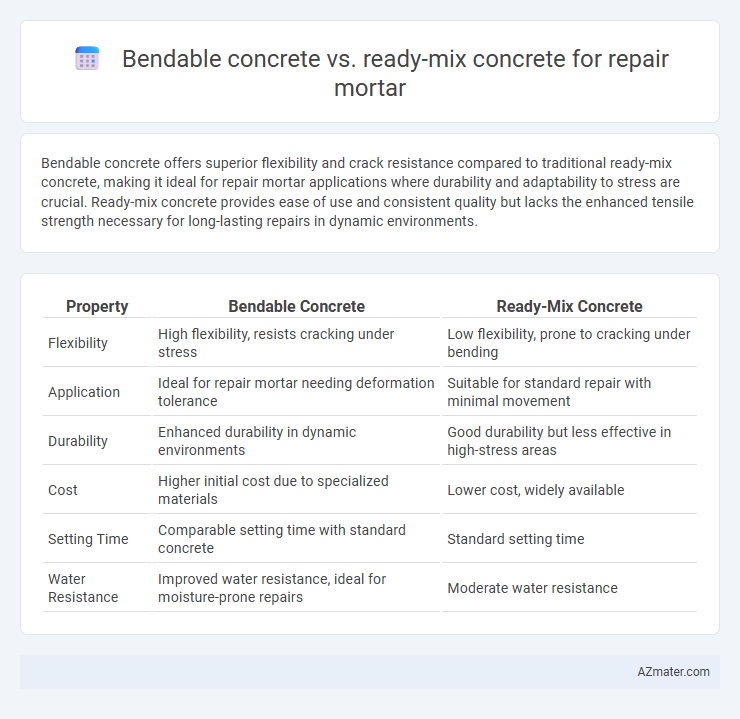Bendable concrete offers superior flexibility and crack resistance compared to traditional ready-mix concrete, making it ideal for repair mortar applications where durability and adaptability to stress are crucial. Ready-mix concrete provides ease of use and consistent quality but lacks the enhanced tensile strength necessary for long-lasting repairs in dynamic environments.
Table of Comparison
| Property | Bendable Concrete | Ready-Mix Concrete |
|---|---|---|
| Flexibility | High flexibility, resists cracking under stress | Low flexibility, prone to cracking under bending |
| Application | Ideal for repair mortar needing deformation tolerance | Suitable for standard repair with minimal movement |
| Durability | Enhanced durability in dynamic environments | Good durability but less effective in high-stress areas |
| Cost | Higher initial cost due to specialized materials | Lower cost, widely available |
| Setting Time | Comparable setting time with standard concrete | Standard setting time |
| Water Resistance | Improved water resistance, ideal for moisture-prone repairs | Moderate water resistance |
Introduction: Understanding Bendable and Ready-Mix Concrete
Bendable concrete features enhanced tensile ductility through engineered fibers, offering superior crack resistance and flexibility compared to traditional concrete. Ready-mix concrete, pre-mixed at batching plants, ensures consistent quality and is widely used for a variety of repair mortar applications. Selecting between bendable and ready-mix concrete depends on structural requirements, with bendable concrete providing advanced durability for demanding repairs while ready-mix offers convenience and uniformity.
Key Differences Between Bendable Concrete and Ready-Mix Concrete
Bendable concrete offers enhanced flexibility and crack resistance due to its engineered fiber reinforcement, making it ideal for repair mortar applications requiring durability under stress. Ready-mix concrete, typically composed of cement, water, and aggregates, provides standard compressive strength but lacks the strain capacity to accommodate structural movements. The key difference lies in bendable concrete's ability to sustain tensile strains up to 0.5%, whereas ready-mix concrete generally fails at strains around 0.02%, influencing longevity and maintenance needs in repaired structures.
Material Composition and Properties Comparison
Bendable concrete incorporates polymer fibers and engineered cementitious composites to achieve high tensile strength and flexibility, making it ideal for crack resistance in repair mortar applications. Ready-mix concrete primarily consists of cement, aggregates, water, and chemical admixtures, offering standard compressive strength but limited flexibility and crack control. The enhanced ductility and durability of bendable concrete outperform ready-mix concrete, reducing maintenance needs and extending the lifespan of structural repairs.
Flexibility and Crack Resistance in Repair Mortars
Bendable concrete offers superior flexibility and crack resistance compared to traditional ready-mix concrete, making it ideal for repair mortars in structures prone to movement or thermal expansion. Its engineered microstructure incorporates fiber reinforcements that enhance tensile strength and accommodate slight deformations without fracturing. In contrast, ready-mix concrete typically exhibits higher brittleness and is more susceptible to cracking under stress, reducing its effectiveness for durable, long-lasting repairs.
Durability and Longevity of Both Concrete Types
Bendable concrete offers superior durability and longevity compared to ready-mix concrete due to its enhanced flexibility and crack resistance, which allows it to withstand dynamic stresses without significant damage. Ready-mix concrete, while widely used for repairs, can be prone to cracking and deterioration under repeated loading and environmental exposure, reducing its lifespan. The improved tensile strength and fracture toughness of bendable concrete make it a more reliable choice for repair mortar applications requiring long-term structural integrity.
Application Techniques for Repair Projects
Bendable concrete offers superior flexibility and crack resistance, making it ideal for repair projects requiring durability under dynamic loads and movement, especially in infrastructure like bridges and pavements. Ready-mix concrete, commonly used due to its convenience and consistent quality, is best suited for straightforward patching and surface repairs where minimal deformation occurs. Application techniques for bendable concrete often involve specialized mixing and curing processes to maintain its ductility, while ready-mix concrete relies on standard mixing, pouring, and finishing methods for quick application.
Cost Analysis: Bendable vs Ready-Mix Concrete
Bendable concrete typically incurs higher initial material costs than ready-mix concrete due to advanced additives like fibers enhancing flexibility and durability. Ready-mix concrete offers cost efficiency and easier procurement, but may lead to higher lifecycle repair costs due to lower crack resistance. Evaluating total ownership cost, bendable concrete's extended durability often results in reduced maintenance expenses, making it a cost-effective choice for long-term repair mortar applications.
Environmental Impact and Sustainability Considerations
Bendable concrete offers enhanced crack resistance and longer durability, reducing the frequency of repairs and lowering material consumption compared to conventional ready-mix concrete. Its formulation often incorporates recycled materials and lower cement content, which decreases carbon emissions and energy use during production. Ready-mix concrete, though widely used, generally has higher environmental footprints due to rapid setting and frequent maintenance needs, making bendable concrete a more sustainable choice for repair mortar applications.
Common Use Cases in Concrete Repair
Bendable concrete excels in structural repairs requiring enhanced flexibility and crack resistance, commonly used in bridge decks, pavements, and seismic retrofitting. Ready-mix concrete is preferred for general patching and surface repairs due to its ease of application and consistent quality, suitable for sidewalks, curbs, and non-structural repairs. Both materials serve distinct purposes in concrete repair, with bendable concrete addressing dynamic stress environments and ready-mix concrete ideal for routine maintenance and restoration.
Conclusion: Choosing the Best Concrete for Repair Mortar
Bendable concrete offers superior crack resistance and flexibility, making it ideal for repair mortar applications requiring durability under dynamic stress. Ready-mix concrete provides consistency and ease of application but may lack the enhanced tensile strength needed for long-lasting repairs. Selecting bendable concrete ensures improved performance and longevity in repair mortar, especially in structures subjected to movement or thermal expansion.

Infographic: Bendable concrete vs Ready-mix concrete for Repair mortar
 azmater.com
azmater.com